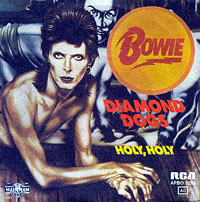This article needs additional citations for verification .(October 2016) |
| "Diamond Dogs" | ||||
|---|---|---|---|---|
 | ||||
| Single by David Bowie | ||||
| from the album Diamond Dogs | ||||
| B-side | "Holy Holy" | |||
| Released | 14 June 1974 | |||
| Recorded | January–February 1974 | |||
| Studio | Olympic, London | |||
| Genre | ||||
| Length | 6:02 | |||
| Label | RCA | |||
| Songwriter(s) | David Bowie | |||
| Producer(s) | David Bowie | |||
| David Bowie singles chronology | ||||
| ||||
"Diamond Dogs" is a 1974 single by the English singer-songwriter David Bowie, the title track of the album of the same name.
Contents
The lyric introduces the listener to Bowie's latest persona and his environment; Halloween Jack dwells on top of an abandoned skyscraper ("Manhattan Chase", a.k.a. One Chase Manhattan Plaza) in a post-apocalyptic Manhattan. The guitar sound is heavily influenced by The Rolling Stones, and signalled Bowie moving away from glam rock and closer to a proto-punk Stooges-influenced sound. [3]
The track was considered by many commentators to be an unconventional single, and it only reached number 21 in the United Kingdom. According to NME critics Roy Carr and Charles Shaar Murray, "As a potential hit single, the title track from Diamond Dogs was something of a non-event. Too long, too bleak in vision, too tough to dance to... you know the drill." [4]
Although it was not issued in the US as a single (despite the fact that copies were pressed in the US for shipment to the UK and were commonly imported into the US for sale in shops that sold imports), the song became a central part of Bowie's North American tour in 1974.
The B-side was a version of Bowie's 1971 single "Holy Holy", re-recorded during the Ziggy Stardust sessions the same year.